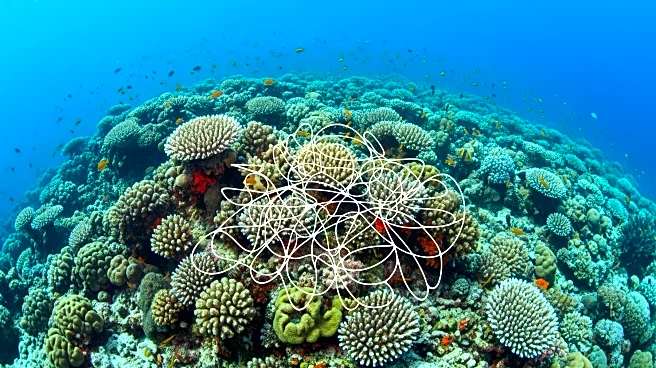What's Happening?
Recent research has delved into the role of octadecanoids, a type of lipid mediator, in the symbiotic relationship between cnidarians, such as corals and sea anemones, and their dinoflagellate algal endosymbionts
from the Symbiodiniaceae family. This study highlights the importance of these lipid compounds in maintaining the ecological success of coral reefs. The research involved long-term cultivation of Symbiodiniaceae cultures and sea anemones, both symbiotic and aposymbiotic, to analyze the production and function of octadecanoids. The study utilized advanced techniques such as chiral supercritical fluid chromatography coupled with tandem mass spectrometry to profile these compounds. The findings suggest that octadecanoids play a crucial role in the symbiotic interactions, potentially influencing the health and resilience of coral reefs.
Why It's Important?
Understanding the biochemical interactions within coral symbiosis is vital for the conservation of coral reefs, which are critical ecosystems supporting marine biodiversity. Octadecanoids, as emerging lipid mediators, could offer insights into how these symbiotic relationships are maintained and how they might be affected by environmental changes. This research could inform strategies to protect coral reefs from threats such as climate change and pollution, which disrupt these delicate symbiotic balances. The study's findings may also contribute to broader ecological and environmental research, offering potential applications in biotechnology and conservation efforts.
What's Next?
Further research is needed to explore the specific mechanisms by which octadecanoids influence coral symbiosis and their potential applications in reef conservation. Scientists may investigate how environmental stressors impact octadecanoid production and function, aiming to develop interventions that enhance coral resilience. Additionally, collaborations between marine biologists and biochemists could lead to innovative approaches to reef management, potentially involving the manipulation of lipid mediators to support coral health.
Beyond the Headlines
The study of octadecanoids in coral symbiosis opens up new avenues for understanding the complex biochemical networks that sustain marine ecosystems. It raises questions about the ethical implications of manipulating natural processes for conservation purposes and the long-term effects of such interventions. As researchers continue to uncover the roles of lipid mediators, there may be broader implications for fields such as synthetic biology and environmental policy.









